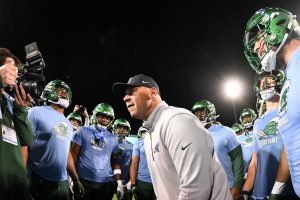Tulane slow to meet Black Student Union’s July demands
February 25, 2021
Seven months have passed since Tulane’s Black Student Union, inspired by last summer’s wave of racial justice protests, issued a set of demands for Tulane’s administration. While tBSU called for “revolution, not reform,” tBSU President Raven Ancar estimates that Tulane has addressed 10 out of 70 initial agenda items.
After tBSU published its demands in July, President Mike Fitts personally emailed Ancar to inform her that Tulane would take steps to address them. He designated Robin Forman, senior vice president for academic affairs, and Annelise Singh, associate provost for diversity and faculty development and chief diversity officer, to coordinate Tulane’s response to the academic aspect of the tBSU demands, according to the university’s statement to The Hullabaloo. Patrick Norton, senior vice president and chief operating officer, headed up the university’s response to the non-academic demands.
Singh, along with Will Ferbos, associate vice president for institutional affairs and deputy chief of staff, has become the point person in the administration for undergraduate activists, meeting regularly with Ancar to provide an ear for student frustrations. Ancar recognizes Singh as one of the most encouraging features of Tulane’s response to tBSU’s demands.
“Some administrators are actually excited about student activism and want to support it,” Ancar said. “[But] Singh is just one person.”
While Tulane has demonstrated willingness to meet some of tBSU’s demands, it has been unresponsive to others. Rather than making “Tulane’s history of racism be a mandatory class,” as tBSU demanded, Tulane says it is working toward reevaluating the TIDES and the race and inclusion aspects of its core curriculum. When asked about the Victory Bell, Ancar said that Tulane will not give reparations to current and former Tulane students because “technically, Tulane is not a plantation.”
The July demands called for increased anti-racist training for students and university employees. Tulane is now grandfathering in “Sexual Harassment and Discrimination Prevention training.” Seventy-six percent of staff has completed the training to date, while the school’s hiring policy requires all incoming staff to do so.
For students, “Admissions and Student Affairs are reviewing ways to strengthen the communication of Tulane values of EDI and anti-racism to prospective and incoming students,” Singh said.
tBSU demanded that Tulane revise its protest policies. Student activists no longer wanted to have to seek permission from administrators. They also demanded that TUPD cease monitoring protests. The university says it has tasked Laura Osteen, assistant vice president of campus life, to work with students on this issue. Ancar believes there has been movement on this issue but change will not occur overnight.
Tulane emphasizes its commitment “to ensure BIPOC students, faculty, and staff experience a sense of belonging, wellness, and empowerment.” The university has displayed that commitment by opening up the Commons to student athletes. Tulane previously restricted student athletes to using Green Wave Grille. The university is currently working on a plan to have a space for historically Black fraternities and sororities who do not have a house near campus.
Still, Ancar has doubts about Tulane’s willingness to back up its support for BIPOC students with financial resources.
“The university could be putting more money toward liberation,” she said.
Similar to reparations, the administration has not met tBSU’s demands for living wages for its employees and COVID-19 refunds, according to Ancar.
In fall 2020, Fitts announced the Louisiana Promise scholarship designed “to help address racial inequities in admissions targeting local New Orleans and Louisiana students.” Over the summer, Campus Health changed its policy by starting to accept Louisiana Medicaid. Additionally, it is now participating in a pilot program to allow students with Louisiana Medicaid to get T-SHIP at no charge.
Ancar expressed exhaustion at having to advocate for the July demands continually.
“We’ve been doing this for over 40 years,” she said. “I don’t know what students will be doing in another 40 years, but I hope it’s something different,” Ancar said referring to the demands issued by the African American Congress of Tulane, a precursor organization to tBSU, in 1968.
The demands from the 1960s called for more Black representation in the faculty, a Black cultural center, and “a minimum of 100 Black students admitted in each new class.” In 2021, tBSU is still advocating for the same goals.









Leave a Comment